Budgies exhibit a unique sleep pattern that aligns with diurnal activity. At night, they enter long periods of deep sleep, punctuated by brief awakenings, while during the day, their naps are more sporadic and briefer.
Their choice of sleeping position varies, from perches near the cage floor to even hanging upside down from the ceiling.
Changes in a budgie’s sleep habits, such as sleeping more than usual or not resting on one leg, can be indicative of health issues.
Ensuring a quiet, comfortable environment free from disturbances like mites is crucial for their restful sleep.
From my own experiences and insights as a former budgie owner, I’ve pieced together this comprehensive guide on budgie sleep habits.
If you’re a curious budgie owner or an enthusiast wanting to provide the best rest for your avian friend, this is your go-to source.
Dive in to discover the intricacies of budgie sleep and ensure your feathered pal enjoys restful nights.
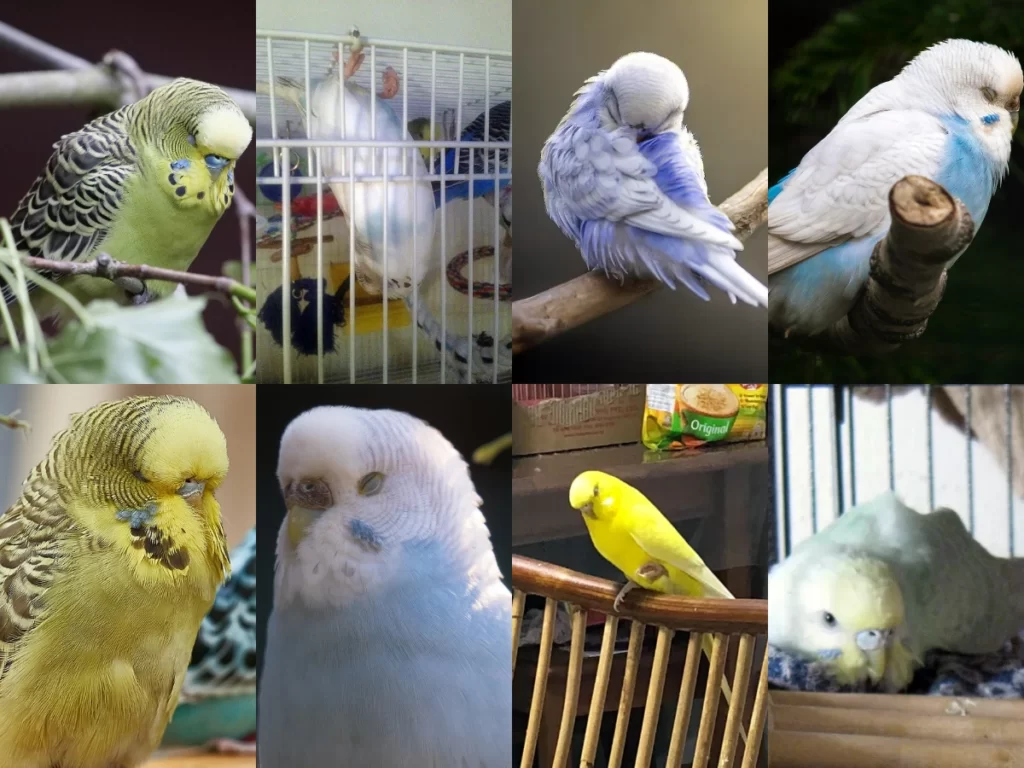
Understanding Budgie Sleep Patterns
Budgies are lively birds that require ample rest to maintain their health and vitality.
Just like humans and other animals, sleep is crucial for these avian creatures.
It aids in their physical well-being, cognitive functions, and overall mood.
Recent studies, like the one referenced from this journal, reveal that budgies, similar to mammals, experience specialized forms of sleep such as slow wave sleep (SWS) and rapid eye movement sleep (REM).
Interestingly, REM sleep in budgies constitutes about 26.5% of their total sleep, a percentage that’s comparable to humans.
This type of sleep is important as it suggests that budgies, like humans, might have vivid dreams and undergo crucial cognitive processes during this phase.
Budgies do show a pattern of sleeping more at night (82.9% of the time) compared to the day (17.4% of the time).
While they often nap during the day, these are usually brief and amidst periods of drowsiness.
On the other hand, nighttime brings long, deep sleep bouts for budgies, characterized by deep rhythmic breathing and occasional brief awakenings.
Budgie sleep isn’t just a static, unchanging state. Throughout a 24-hour period, their sleep goes through several cycles and states.
For instance, after lights go off, budgies will typically fall asleep within the first hour and then experience a consolidated block of sleep till just before lights on.
The sleep structure of these birds involves fluctuations between vigilance states, and they display patterns like waking up or becoming drowsy and experiencing short bouts of intermediate sleep.
During the day, budgies remain mostly active, displaying behaviors such as climbing or remaining perched.
However, nighttime activity differs. After the lights are switched off, they engage in 10-20 minutes of vigorous movement, sometimes circling their enclosures multiple times before finding a suitable sleep spot.
Some even climb up the sides or onto the ceiling of their enclosures for sleep.
Such behaviors emphasize the distinction between daytime activities and nighttime rest patterns in budgies.
Night Frights
Night frights are a common concern for many budgie owners. At night, these small birds can suddenly get startled and panic, leading to potentially harmful thrashing within their cage.
What triggers night frights? There could be various reasons. Sometimes, even the slightest change or movement in their surroundings can cause a budgie to panic.
It might be a shadow or a sudden noise that they aren’t familiar with.
Even the rustling of leaves or a car’s headlights shining through a window can lead to a fright.
When a budgie experiences a night fright, they might fly around their cage erratically.
This can lead to injuries if they crash into the cage bars or their perch.
You might find feathers on the cage floor in the morning, an indicator that a night fright occurred.
One way to reduce the chance of night frights is by covering the budgie’s cage at night.
This provides a sense of security and helps block out unexpected light or shadows.
However, it’s important to ensure the covering is breathable and doesn’t cause the cage to become too warm.
Common Budgie Sleeping Positions
Every budgie, like other avian species, has its own way of resting.
Understanding these positions can help you understand your bird’s health and comfort level.
During the day, budgies often nap but remain perched closer to the floor of the enclosure.
At night, however, they tend to engage in longer, deeper sleep sessions. Their nighttime slumber is often characterized by rhythmic breathing and occasional muscle twitches.
These nighttime sleeps sometimes come with brief awakenings, during which the budgie might change its sleeping position or even snack a little.
Another common sight is budgies settling in their favorite spot once the lights go off.
Post lights-out, they may be vigorous in their activity, sometimes circling their cage before finally picking a place to rest.
This behavior is a part of their night routine before they fully settle down for sleep.
Here, we delve into some of the most common positions observed in budgies during their sleep.
Sleeping On One Leg
When you spot a budgie standing on one leg while it sleeps, it’s generally a sign of comfort and good health.
Birds often adopt this posture to conserve body heat by tucking one of their legs into their feathers.
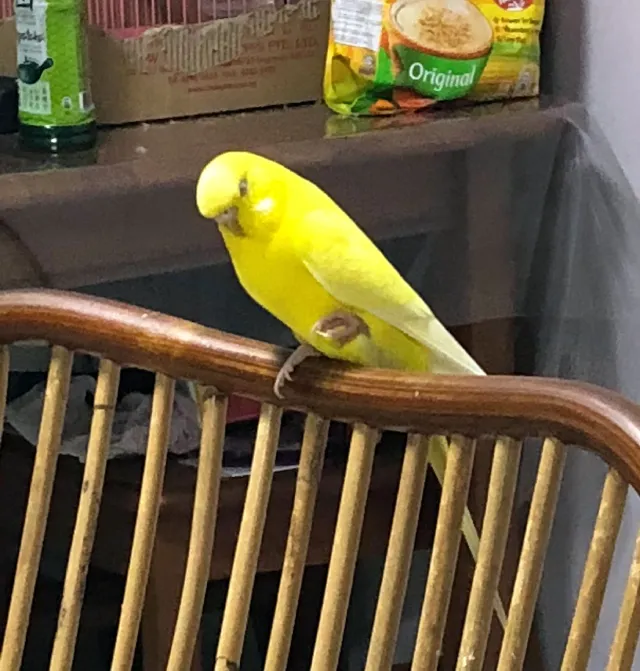
It’s akin to us curling up in bed. Interestingly, standing on one leg and sleeping is not just unique to budgies but is seen across many bird species.
If a budgie, which usually sleeps standing on one leg at night, suddenly changes this habit, it can be a warning sign.
It may indicate the onset of an illness or discomfort. Similarly, changes in food and water consumption, or a previously cuddly budgie turning away from its partner, can be red flags pointing to health concerns.
It’s crucial to always be observant of any behavioral changes, as they can often be the first indicators of potential issues.
Sleeping while Hanging Upside Down
Budgies sometimes choose unique positions, like hanging upside down from the ceiling or cage roof to sleep.
Some birds were observed sleeping this way for hours. This position might seem unusual, but it’s a normal behavior for some budgies.
It showcases their agility and adaptability in finding comfortable spots.
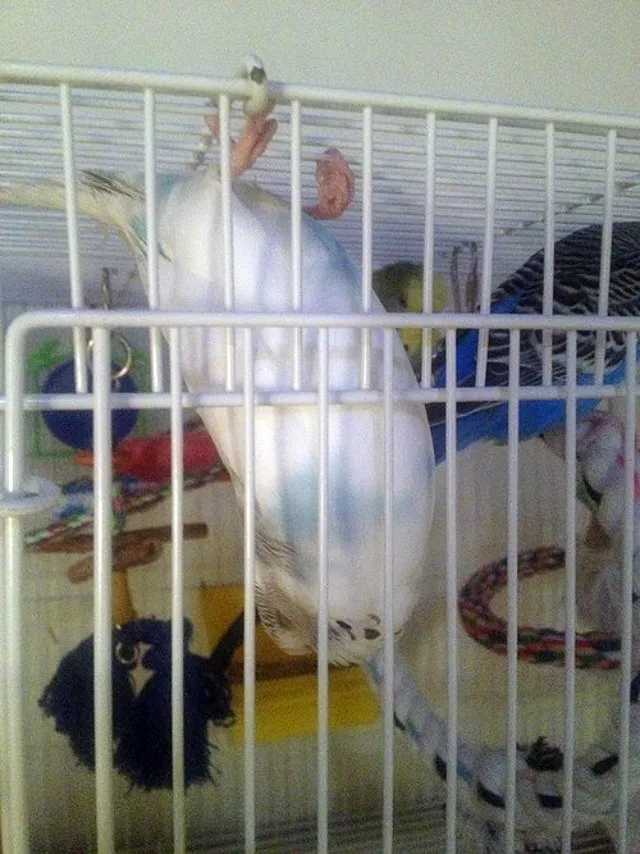
Sleeping Lying Down
Although rarer, a budgie might sleep lying down. This position can be alarming for owners, as lying down can sometimes indicate health issues.
If a budgie appears weak or is lying down more often than usual, it could be an early indicator of sickness.
However, this behavior doesn’t always imply a health problem, especially if the bird seems alert and active when awake.
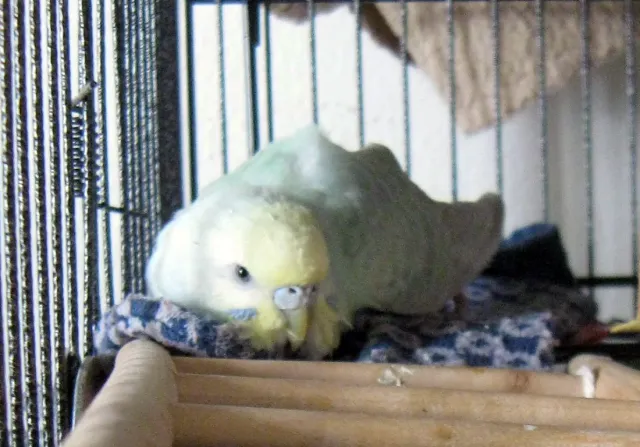
Sleeping while Curling Head into the Feathers: Pillow Effect
Budgies often curl their heads into their feathers, creating a pillow effect. This position provides warmth and protection.
They nuzzle their beaks into the feathers on their back or wings, allowing them to rest comfortably.
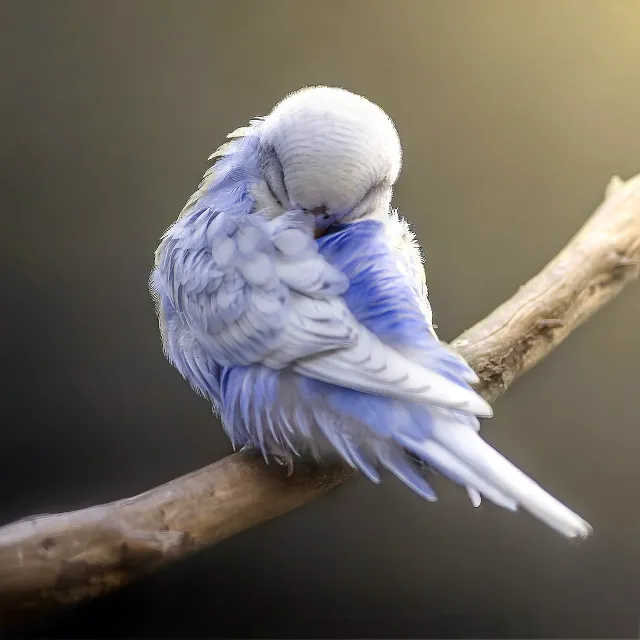
Sleeping On Side of Cage
At night, it was observed that budgies like to climb the sides or even onto the ceilings of their cages to sleep.
This behavior is unique to their night routine, as such climbing is seldom seen during the day.
This position offers them a sense of security, being high up and away from potential threats.
However, any significant changes in their preferred sleeping spot, like moving to the cage floor, can indicate distress or health problems.
Budgie Sleep Environment
When it comes to ensuring your budgie gets the best rest, understanding their sleep environment is crucial.
Just like humans, these little avian creatures have specific needs that contribute to a good night’s sleep.
Ideal Conditions for Budgie Sleep
Importance of Darkness and Quietness: The Effect of Different Lighting Conditions on Budgie Sleep
All budgies exhibit a diurnal pattern of activity, meaning they are most active during the day and rest at night.
Lights off often signals bedtime for these birds. During this time, they might be seen moving around their enclosure for about 10-20 minutes, possibly even circling the perimeter, before settling down for the night.
Interestingly, studies discovered that the lighting conditions used in many older bird studies disrupted the sleep structure of budgerigars.
Proper darkness is essential for these birds to maintain their natural sleep cycle.
Keeping their cage in a dimly lit or dark room can help them sleep better.
It’s equally important to ensure a quiet environment. Just as sudden lights can disrupt their sleep, so can loud noises.
Suitable Temperature and Humidity Levels
Budgies are sensitive to extreme temperatures. For optimal sleep, the cage environment should be kept at a comfortable and consistent temperature, avoiding drafts or sudden temperature changes.
High humidity levels can be uncomfortable and might lead to respiratory issues.
It’s best to keep the room at a moderate humidity level, ensuring the bird feels comfortable and safe.
Common Sleep Disturbances and How to Avoid Them
Noises: TV, Music, Fans
Budgies, like other birds, can be easily startled by sudden noises. While they might get used to the everyday sounds in a home, sudden loud noises from a TV, music, or fans can disturb their sleep.
If you notice your budgie is frequently waking up or seems restless, it might be a good idea to check the noise levels in their environment.
Light Interruptions: Artificial Lights, Frequent Room Activity
Budgies need darkness to sleep well. Artificial lights, be it from room lights or electronic devices, can disturb their sleep.
If their cage is placed in a busy part of the home where lights are frequently turned on and off, or where people often pass by, it might disrupt their rest.
Finding a consistent, low-light environment for the cage during the night can ensure your budgie gets the sleep it needs.
Do Budgies Sleep with Their Eyes Open?
After a day filled with activity, budgies need their rest just like any other living creature.
However, one might wonder if these little avian creatures sleep with their eyes open.
Distinguishing between Resting and Deep Sleep
Budgies have a unique way of resting. They can take short naps during the day, which might seem like they are just resting with their eyes open or half-closed.
But during deep sleep, especially at night, their eyes are closed. A deep sleep in budgies is often characterized by deep rhythmic breathing, muscle twitches, and sometimes their head drooping.
Indicators of Healthy vs. Unhealthy Sleep in Budgies
Signs of Healthy Sleep
Healthy sleep in budgies is crucial for their overall well-being.
- Regular Sleep Cycles: Budgies have diurnal patterns, which means they are active during the day and sleep at night. At night, they engage in longer, deeper sleep. Studies showed that budgies slept far more at night (82.9% ± 6.9% of time) than during the day (17.4% ± 11.9% of time).
- Peaceful Rest with Minimal Disturbances: While they might have brief awakenings, these are short-lived. A peaceful sleep usually means they are in a comfortable environment without disturbances.
Signs of Disturbed or Inadequate Sleep
Sleep disturbances or inadequacies in budgies can indicate various issues.
- Sleeping Excessively during the Day: If a budgie suddenly sleeps more than usual during the day, it can be a sign of an underlying issue. Either the bird may have an undiscovered disease, or it’s not getting restful sleep at night. Issues like a mite infestation or a restless environment can disturb their nighttime sleep.
- Prolonged Fluffiness and Lethargy: If a budgie remains fluffy and shows signs of lethargy throughout the day, it might not be getting adequate sleep. Prolonged fluffiness can also be a sign of illness.
- Signs of a Budgie Being Sick Related to Sleep: Changes in Behavior: Any sudden change in a budgie’s sleeping pattern can be alarming. For instance, if a typically energetic budgie suddenly sleeps a lot, it can be a cause for concern.
- Food/Water Consumption: If a budgie drinks considerably more water than usual, it might have a kidney infection. Or, if the bird eats more but seems to be losing weight, it could be a digestive system disease.
- Pairing Behavior: Budgies often pair up and can be quite cuddly. If a normally cuddly budgie starts avoiding its partner, it might be feeling unwell.
- Older Birds’ Behavior: Older budgies, especially those more than twelve years old, might need more sleep than their younger counterparts. However, if they suddenly sleep even more than their usual, it could be an early sign of an issue.
Why Your Budgie Might Be Sleeping a Lot: Potential Reasons and Solutions
Budgies, like other birds, show behavioral changes when they are not feeling well.
For instance, a budgie might stop sleeping on one leg, which can indicate the beginning of an illness.
Changes in food and water consumption are also important signs. Drinking more might hint at a kidney infection, while eating more without weight gain can point to digestive system issues.
If a usually cuddly budgie starts avoiding its partner, it might be feeling unwell.
When a budgie can’t stay on its perch and rests at the cage floor, it’s possibly seriously ill.
Molting and Its Effects on Sleep
During the molting phase, a budgie might seem different. It could be because of the physical discomfort they feel during this time, leading them to sleep more or avoid interactions.
However, this is generally temporary and should pass as the molting phase concludes.
The Role of Age in Sleep Patterns
Older budgies, especially those more than twelve years old, naturally need more sleep compared to their younger counterparts.
It’s essential to note any sudden increase in their sleep beyond this, as it might be a sign of health issues.
Importance of Adequate Cage Space
Adequate cage space ensures that the budgie has room to move and select a comfortable sleeping spot.
Budgies have shown patterns of climbing up the sides and sometimes even onto the ceilings of their enclosures to sleep.
Providing ample room helps in ensuring a better rest for them.
Tips to Ensure Your Budgie Gets Quality Sleep
Establishing a Consistent Sleep Routine
Budgies have diurnal patterns of activity. Having consistent light schedules ensures they get quality rest.
Typically, once the lights are turned off, they will engage in some activity before settling down for the night.
During the day, while they might nap often, it’s observed they sleep more at night (82.9%) than during the day (17.4%).
Preparing Your Budgie for Bedtime
Before budgies sleep, they engage in a period of activity. Making sure their environment is calm during this time can help.
They sometimes circle their enclosure before finding their preferred spot. Ensuring the cage is in a quiet area and perhaps dimming lights gradually can signal bedtime.
The Role of Comfortable Perches and Their Placement
Comfortable perches are crucial. During the day, budgies often rest near the floor of their enclosure, but at night they might prefer higher spots.
Perches should be placed at varying heights, allowing the budgie to choose.
This choice ensures they can find a spot where they feel secure and can enter deep sleep stages, necessary for their well-being.
Budgie Sleep FAQS
Can Budgies Sleep with Light On?
Budgies have a diurnal pattern of activity. They are most active during the day and rest at night.
It’s crucial to note that consistent lighting conditions are significant for their sleep.
When the lights go off, these little birds engage in vigorous activity for about 10-20 minutes before finding their preferred spot to rest.
The wrong lighting conditions, especially during sleep time, can dramatically disrupt a budgie’s sleep structure.
So, while they can technically sleep with light on, it’s not optimal for their sleep health.
Do Budgies Dream?
Yes, budgies show signs of dreaming. Birds and mammals share specialized forms of sleep, such as slow wave sleep (SWS) and rapid eye movement sleep (REM).
REM sleep is often linked to dreaming in many animals, including humans.
Budgies were found to have REM that constituted 26.5% of their total sleep, similar to humans.
This suggests that budgies do have dreams during their sleep cycle.
How to Differentiate between a Resting Budgie and a Sleeping One?
Observing a budgie’s behavior can provide clues. During the daytime, budgies might be found resting near the floor of their enclosure, but they are not in a deep sleep.
Their naps during the day are brief sleep episodes amid periods of drowsiness.
At night, however, they engage in long bouts of deep sleep characterized by deep rhythmic breathing, muscle twitches, and head drooping.
Another indicator of sleep is their position: at night, they often climb to higher spots, sometimes even the ceilings of their enclosures, to sleep.
Is It Normal for a Budgie to Sleep on the Cage Floor?
While budgies predominantly sleep in elevated positions within their cage, a budgie resting on the cage floor can be a sign of illness.
If a bird suddenly can’t stay on a perch and crouches in a corner on the cage floor, it might be seriously ill.
It’s essential to monitor any changes in sleeping behavior, as it can provide crucial information about the bird’s health.
How Can I Tell If My Budgie’s Sleep Schedule Is Disrupted?
A disrupted sleep schedule in budgies can manifest in several ways. For instance, if your energetic bird suddenly sleeps more during the day without an apparent reason, it could indicate a problem.
They might be suffering from an illness or not resting well at night.
Factors like a cage infestation with blood-sucking mites or placing the cage in a restless location can disrupt their night rest.
Examining the distribution of droppings on the cage floor can give hints about nocturnal sleep disturbances.
Additionally, sudden changes in behavior, like a usually active budgie becoming more lethargic or resting more frequently, can indicate a disrupted sleep schedule.
Can External Factors, Such as Diet or Interaction, Impact a Budgie’s Sleep?
Absolutely. Budgies have diurnal patterns of activity. They are influenced by what happens around them throughout the day.
For instance, diet can play a crucial role. If a budgie consumes a large amount of food suddenly or drinks considerably more than usual, it might indicate issues like kidney infections or digestive system diseases.
Moreover, if a bird’s cage is infested with blood-sucking mites or placed in a very restless place, it can disrupt their sleep at night.
Interaction with other birds or even their human caregivers can also impact sleep.
For instance, in mated birds, a usually cuddly individual turning away from its partner could indicate discomfort or a need for more rest.
Additionally, a budgie seeking physical contact when unwell might be looking for protection and warmth.
Should I Cover My Budgie’s Cage at Night to Promote Sleep?
Yes, covering a budgie’s cage at night can be beneficial. It can create a quiet, dark environment that mirrors natural nighttime conditions, promoting a healthy sleep cycle.
In fact, budgies often go into a state of deep sleep during nighttime, which is evident from signs like deep rhythmic breathing, muscle twitches, and head drooping.
A covered cage can also help in protecting them from disturbances like light or noise.
How Do Seasonal Changes Affect Budgie Sleep Patterns?
Seasonal changes, especially variations in daylight, can influence a budgie’s sleep pattern.
As creatures of habit, budgies often sleep more during the longer nights of winter and less during the shorter nights of summer.
It’s crucial to ensure they get adequate rest and adjust to the changing patterns.
Is There a Specific Amount of Hours a Budgie Should Sleep Daily?
Typically, budgies sleep more at night (82.9% ± 6.9% of time) than during the day (17.4% ± 11.9% of time).
It means they spend a significant portion of their nighttime in sleep, which can be roughly 10-12 hours, depending on the length of the night.
Daytime naps are often short and sporadic. However, older budgies, especially those over twelve years, might need more sleep than their younger counterparts.
What Should I Do If My Budgie Doesn’t Want to Sleep at Its Usual Time?
First, check for any external disturbances. Ensure there are no mites in the cage or that the cage isn’t placed in a restless area.
Observe if the bird shows signs of discomfort or illness, such as not standing on one leg while sleeping or changing its food and water consumption patterns.
If your bird displays unexpected behaviors or seems weak, it might be indicative of a health issue.
If such signs persist, consult with an avian veterinarian for guidance.
Can Playing Soft Music or Sounds at Night Aid in Budgie Sleep?
Budgies have unique sleeping habits. Playing soft music or sounds at night can sometimes create a comfortable sleeping environment for budgies.
But it’s essential to ensure the music isn’t too loud or jarring.
Budgies exhibited consolidated sleep, a pattern seen in many species, including humans.
Thus, just as some humans find solace in white noise or calming tunes, budgies might appreciate gentle auditory cues.
However, always monitor your budgie’s reaction to the sound to ensure it’s not causing distress or interrupting their night routine.
Should I Be Concerned If My Budgie Makes Noises While Sleeping?
Budgies, during their nap time, might occasionally make noises. This is often a sign of them being in the deep rhythmic breathing phase of their sleep, which is a natural and healthy part of their sleep cycle.
Occasionally, these sounds can be associated with budgie dream scenarios. However, if the noises are frequent, abrupt, or seem distressed, it might be a sign of budgie sleep problems.
Monitoring and understanding the signs a budgie is tired or in distress is crucial for their well-being.
How Do I Handle a Budgie That Is Sleep Deprived?
If a budgie is showing signs of sleep deprivation, such as being unusually lethargic during the day or having disrupted sleep patterns at night, it’s crucial to identify the cause.
Budgies, on average, sleep 10-12 hours a day. Any deviation from this could indicate sleep deprivation.
Creating a comfortable sleeping environment is key. Ensure the cage is in a quiet location, free from disturbances.
Consider covering the budgie’s cage at night to block out light and reduce potential disruptions.
Can Frequent Relocation of the Cage Affect Budgie Sleep Patterns?
Yes, relocating the cage frequently can disrupt a budgie’s sleep cycle. Budgies, being diurnal birds, have a set night routine and changing their environment often can cause confusion and stress.
A stable environment is crucial for their nap time and overall sleep health.
If a cage must be moved, doing so gradually and ensuring the new location is quiet and safe is essential.
Do Budgies Experience Sleep Disorders Similar to Humans?
Budgerigars have sleep patterns and structures that are quite similar to humans, including REM sleep.
While the exact sleep disorders might differ, budgies can face disruptions in their sleep.
Changes in budgie bedtime habits, unusual sleeping positions, or shifts in their sleep cycle can be signs of underlying issues.
Any sudden or prolonged change in a budgie’s sleep pattern should be observed carefully, as it might indicate a potential health problem.
Is There a Connection between Budgie Vocalizations and Their Sleep Quality?
Budgies are known for their vocalizations, and there can be a connection between their calls and sleep quality.
If a budgie is restless at night or faces budgie night frights, their vocalizations might change or become more frequent.
A budgie that is sleep-deprived or uncomfortable might also become less vocal during the day.
Monitoring their calls, along with observing their sleeping habits, can provide insights into their overall health and well-being.
Always ensure they have a comfortable perch, a quiet environment, and proper care to support their sleep health.



